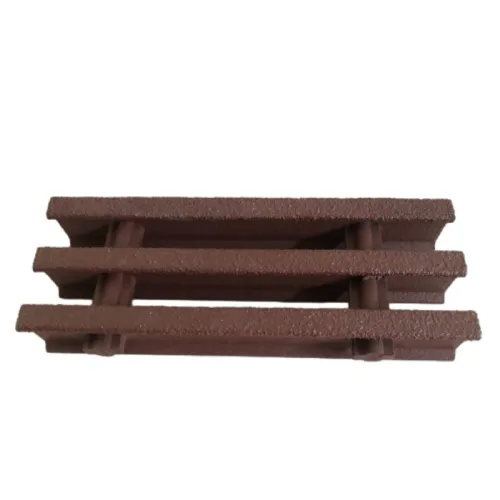loading...
- No. 9, Xingyuan South Street, Dongwaihuan Road, Zaoqiang County, Hengshui, Hebei, China
- admin@zjcomposites.com
- +86 15097380338
- Welcome to visit our website!
Understanding the Design and Applications of FRP Vessels in Modern Industries
Understanding the Importance of FRP Vessels in Modern Applications
Fiber Reinforced Plastic (FRP) vessels are increasingly gaining prominence in various industries, thanks to their unique properties that combine strength, durability, and lightweight characteristics. As sectors such as chemical processing, wastewater treatment, and storage solutions evolve, the demand for advanced materials like FRP is on the rise. This article explores the significance, benefits, and applications of FRP vessels, along with some insights into their manufacturing processes.
What are FRP Vessels?
FRP vessels are structural components made from a composite material consisting of a polymer matrix reinforced with fibers, typically glass or carbon. This combination results in a material that boasts an excellent strength-to-weight ratio, high corrosion resistance, and the ability to withstand extreme temperatures. Consequently, FRP vessels are highly preferred in situations where traditional materials like steel or concrete may falter under harsh conditions.
Advantages of FRP Vessels
1. Corrosion Resistance One of the standout features of FRP vessels is their resistance to chemical corrosion. In environments where aggressive chemicals are present, traditional materials can degrade over time, leading to leaks and failures. FRP vessels, on the other hand, maintain integrity, reducing maintenance costs and improving safety.
2. Lightweight Compared to metal vessels, FRP vessels are significantly lighter. This attribute allows for easier handling, installation, and transportation. Additionally, the reduced weight can lead to lower structural support requirements, facilitating easier and more cost-effective construction.
3. Design Flexibility The manufacturing process for FRP allows for complex shapes and customized designs. Manufacturers can tailor the vessels to meet specific specifications, ensuring optimal performance for unique applications.
4. Thermal Insulation FRP materials provide good thermal insulation properties, making them suitable for applications requiring temperature control. This feature is particularly beneficial in storage and transportation of temperature-sensitive materials.
ro frp vessel

5. Longevity With proper maintenance, FRP vessels can last for decades, outpacing many traditional materials' lifespans. Their durability translates to lower lifecycle costs, making them a smart investment for industries.
Applications of FRP Vessels
1. Chemical Storage Due to their excellent chemical resistance, FRP vessels are widely used for storing various chemicals, including acids, alkalis, and solvents. Industries ranging from pharmaceuticals to agriculture rely on these vessels for safe material handling.
2. Wastewater Treatment In wastewater treatment plants, FRP vessels are employed in applications such as aeration tanks, sedimentation tanks, and chemical dosing systems. Their resistance to corrosion from aggressive wastewater ensures the longevity and reliability of these critical systems.
3. Food Processing The food industry benefits from FRP vessels due to their ease of cleaning and resistance to contamination. They provide a hygienic option for storing and transporting food-related products.
4. Marine Applications In the marine industry, FRP vessels are utilized for tanks and other structures that need to withstand harsh marine environments. Their lightweight nature and corrosion resistance significantly enhance performance and safety.
5. Oil and Gas FRP vessels are also finding applications in the oil and gas sector, particularly for offshore operations. Their ability to resist aggressive environments and reduce weight on platforms makes them ideal for storing and processing various hydrocarbons.
Conclusion
The growing reliance on FRP vessels across multiple sectors underscores their importance in modern industrial applications. Their unique advantages—like corrosion resistance, lightweight properties, and design flexibility—make them a preferred choice over traditional materials. As industries continue to innovate and seek efficiencies, FRP vessels will play a crucial role in enhancing safety, performance, and sustainability. For businesses looking to embrace advanced materials, investing in FRP technology could yield significant benefits, positioning them at the forefront of their respective industries. The future of material science is indeed bright, with FRP leading the charge into a more resilient and efficient age.
-
GRP Structures: The Future of Lightweight, High-Performance EngineeringNewsJun.20,2025
-
FRP Water Tank: High-Performance Storage for Corrosive and Clean Water SystemsNewsJun.20,2025
-
FRP Square Tube: The New Industry Standard for Chemical and Structural ApplicationsNewsJun.20,2025
-
FRP Pultruded Profiles: The Ultimate Choice for Lightweight Structural StrengthNewsJun.20,2025
-
FRP Handrails: The Safer, Smarter, and Stronger Choice for Modern InfrastructureNewsJun.20,2025
-
FRP Grating: The Smart Solution for Durable, Lightweight Industrial FlooringNewsJun.20,2025
-
Why Choose a Galvanized Water Tank for Your Storage NeedsNewsMay.21,2025
